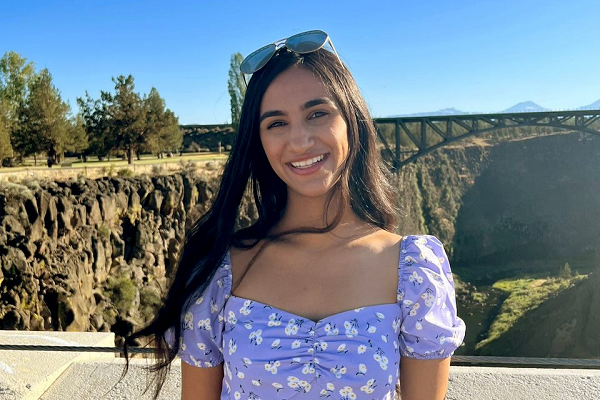Volunteer spotlight: 'I want to bring light. I want to be a resource.'

“Are you OK?”
“Do you need to go anywhere?”
“Do you need help?”
“There’s nothing to worry about — you’re in the right place.”
Harveer K., 25, began volunteering at Salem Health right after she graduated high school in 2017. At first, she wanted to become a doctor, and thought volunteering would be a good way to test the environment and gain experience. But as she studied at Oregon State University, her plans changed.
“I decided ‘doctor’ was not something I wanted to do, and I started pursuing psychology,” Harveer said. “But I liked the environment of Salem Health, and I liked the people and I liked helping, so I stuck around.”
She stuck around for six years, giving at least four hours a week.
This fall, armed with her Bachelor's of Science in Psychology from OSU, Harveer is moved to Colorado to attend the University of Denver, where she’ll receive her Master of Arts in International Disaster Psychology: Trauma and Global Mental Health.
But more on that later.
In her time on the Salem campus, Harveer served in medical telemetry and the food pharmacy, sending patients home with grocery bags filled with two to three days of food. She also stocked gloves, filed and checked in with patients to see if they needed food, water, coffee or a chat.
“Sometimes we would just talk to them,” Harveer said. “They just needed an ear to listen.”
Most recently, Harveer served in the emergency department, helping patients get registered and helping visitors reach their families.
“I’m just seeing if there is anything that they need,” Harveer said. “I’m making sure they have a good day at the hospital.”
One moment in the ED sticks out. A dad arrived with a baby who had fallen. The mom was on her way and the dad was alone and frantic.
“I went up to him and said, ‘It’s ok. The baby’s not crying. He’s OK, right? We’re gonna get him checked in,’” Harveer said. She helped the dad calm down, walked him through the check-in process, explained what would happen next and helped him get to the triage nurse.
As the dad steadied, he was so thankful to Harveer for her help.
“He told me, ‘You know what? I didn’t know what to do. And you really helped me calm down,’” Harveer said. She had seen her share of frantic parents in the ED and knew what he needed.
“It’s good to know we have someone here other than the nurses and the hospital staff who can check in on the family and make sure that they’re there for their kids,” she said.
Harveer’s time in the ED talking with patients (in Hindi, Punjabi and English, no less) and hearing their stories ignited her desire to pursue her master’s.
“I didn’t know what to do with my psychology degree, I didn’t know what direction I wanted to go in,” she said. But hearing patient stories and seeing the trauma of a busy ED made it clear.
“And that’s when I was like, ‘OK. I’ve got something I want to pursue,’” Harveer said. Mental health. Her own background and heritage also fanned the flames.
Harveer is a Sikh and in her Punjabi culture, mental health isn’t a topic many like to chat about.
“People here like my family, we don’t seek out mental health,” Harveer said. “It’s a taboo topic to talk about. And I want to bring light to that. I want to be a resource for them.”
She says many in India, particularly in the state of Punjab, suffer through mental health issues with nowhere to turn.
“Punjab doesn’t have the resources, because of stigma,” Harveer said. “If you have any mental health issues, you’re labeled as a crazy person, so a lot of people just don’t talk about it. So for men, they end up turning to substance abuse or drinking . . . and women end up just talking to each other. They don’t have a way to express themselves in a safe and open environment.”
Harveer is on a mission to change that.
“My goal after I get my training in trauma and global mental health is to go back to India and open an institution to train others, so we have an environment where we can talk about these things and people can get the help they need,” she said. “I can’t wait to move and start my master’s program.”